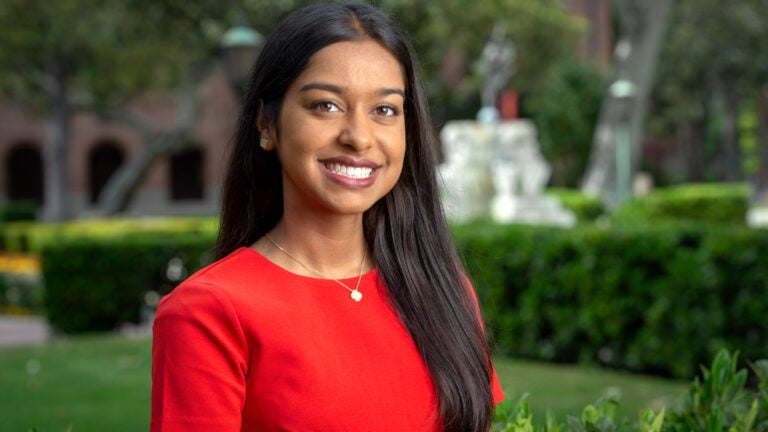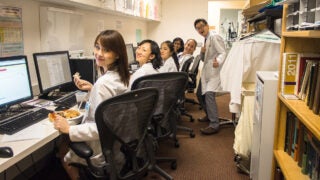
Salutatorian Diviya Gupta brought CPR training to more than 1,000 students in South Los Angeles. (USC Photo/Gus Ruelas)
Salutatorian Diviya Gupta wants to make medicine more accessible
Diviya Gupta became interested in medicine when her grandfather was diagnosed with an unfamiliar disease. With graduation right around the corner, she is looking forward to bringing her skills as a physician to underrepresented areas.
A couple of years ago, Diviya Gupta remembers going for a walk with her grandfather. They were at a park near his house in Los Alamitos when she started to notice something was off with his gait.
“The way he was walking was very rigid,” she said. Her grandfather, who she calls “Baba” in Hindi, was around 80 years old at the time.
A few years in at USC, Gupta had begun studying Parkinson’s disease and specifically looking at how motor coordination like gait was impacted. She got him to schedule an appointment right away.
It turned out he had normal pressure hydrocephalus (NPH), a buildup of fluid in the brain’s ventricles. Unfamiliar with the disease, Gupta got curious — finding whatever she could online about shunts.
But “I wasn’t getting the information I wanted,” she said.
When her grandfather was out of surgery, she decided to reach out to his neurosurgeon, Jefferson Chen. Next thing she knew, she was standing in scrubs next to him as he performed a shunt on a man by burrowing a hole behind his ear into his brain. She’s been shadowing him ever since.
What prompted this USC salutatorian to pursue medicine
Getting the opportunity to understand her grandfather’s condition and the treatments available made her want to be a physician. It also showed her the importance of connecting to patients and their families — arming them with the information and knowledge to make decisions and understand their ramifications.
Gupta, one of USC’s 2019 salutatorians, always wanted to help people. That was core to her interest in medicine, first inspiring her curiosity in high school. During her summers, starting when she was 15, she would go to L.A. from Huntington Beach a few times a week to study alongside a UCLA neuropathologist. The research looked at how Latinos responded to a common malignant brain tumor called a glioblastoma.
“He would take me to the autopsies and show me the brain with the medical students and dissect them in front of me,” she said.
She continued that work at USC while adding on additional research, working with Khalil Iskarous, associate professor of linguistics, and Andrew Gracey, associate professor of biological sciences. Gracey is currently investigating worms with malfunctioning dopamine for hints into Parkinson’s disease. Those with the disease are lacking dopamine, affecting motor movement. They look at the worm because it’s engineered similarly to the human tongue.
USC 2019 salutatorian extends her medical boundaries
But helping others goes beyond the operating room. She knows that, when a crisis hits, often emergency personnel or first responders aren’t there. Volunteering with the Red Cross, she enjoyed teaching her peers CPR. She went on to bring CPR training to South L.A. middle schools, where she’s trained 1,200 students.
“[The students] told me they taught CPR to their family and friends, which has been really cool to hear,” Gupta said, a biology major at the USC Dornsife College of Letters, Arts and Sciences.
When I came in, I didn’t really know why I wanted to be a physician. I just knew I wanted to help people.
Diviya Gupta
When talking about this community work, Gupta often brings up the phrase “effective bystander.” This idea of being useful when crisis hits doesn’t just apply to CPR. While in the Undergraduate Student Government senate, she created an effective bystander program to train campus organizations to combat sexual assault and misconduct. Her work with USC Student Health has led to two pilot programs with about 40 students — teaching students preventive and supportive actions.
Gupta, who plans to attend medical school in the fall, wants to continue working with underrepresented populations and making medicine accessible.
“When I came in, I didn’t really know why I wanted to be a physician. I just knew I wanted to help people,” she said. “I think USC taught me how important social responsibility is in the medical profession.”



